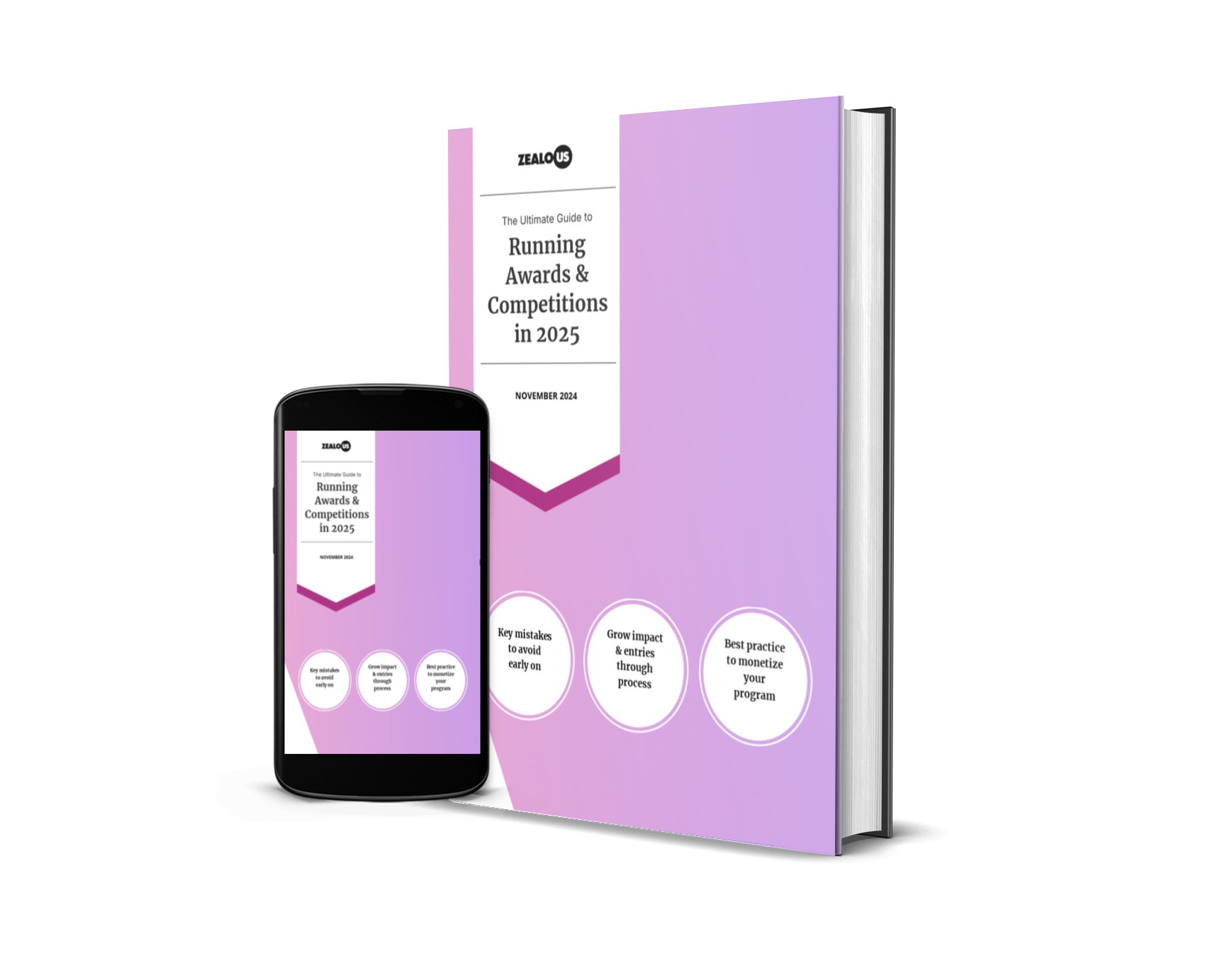You are probably bored of hearing it, but much has changed since the start of 2020:
- The black lives matter movement has swept across the globe.
- Global warming has become impossible to ignore.
- Society has been brought in and out (and in again) of isolation by the bug.
Some organisations have seen these challenges as a call to arms. Others have seen it as a need to take a step back and think.
Nine months on, it is clear our world will live in COVIDs shadow for a little while longer. Having seen competitions being successfully run at this time, we thought it was time to share a few insights on what to consider running a successful competition in 2021.
️Strategy
Should I be running a competition?
In the last seven months, many organisations have mitigated risks by moving existing projects and freezing new initiatives. This has in turn led to a lack of opportunities for creative talent across the industry at a time when they need it most. Now is the perfect time for you to galvanize your values and support the communities that you serve. Remember that those who help us in our time of greatest need; are not easily forgotten.
It is also worth noting that with uncertainty going into next year, being quiet for any longer could be at your detriment and lead to losing exposure to your audiences and risk future funding.
Of course, solvency should always be your priority, so should running a competition put you at risk – consider if it is possible to create a lighter version of what you initially planned. However, it is also worth noting that for organisations whose income streams depend on running awards or support from external funders (e.g., Arts Council England) pushing back on your objectives will negatively impact your ability to bring in future funds.
Lost your audience in a physical space?
Open calls are a wonderful way of engaging with them in a digital context. An open exhibition could also guarantee your community returns when your doors reopen.
Organising annual open calls?
Remaining in your audiences’ mind is pivotal to ensure you do not lose access to them. If the risk is too high, consider creating a lighter version of your annual open call.
Raising public funding?
If your funding depends on championing the arts, a competition can help you engage with creative talent, support them when they need it most and make a case to your funders.
️Planning
Build agility into your schedule
With lockdowns changing all the time, it is hard to guarantee physical events on specific dates (e.g., Exhibition, Award Evening…). Making promises to candidates, especially if you charge a fee, could lead to disappointment.
At this stage, it is better to under-promise and over-deliver. Ensure you highlight what may or may not happen based on government regulations, and backup plans should it not happen in your guidelines. E.g.
“We hope to display all selected works at the National Gallery on the 28th of January 2021.
Due to on-going COVID regulations the venue and dates may need to change. We will inform you of any changes as soon as possible.
In the worst of cases where an exhibition is not possible, we will aim to give you as much exposure through a digital exhibition and zoom call.”
Also, diversifying what winning candidates get (cash prize, exposure to judges, feedback for the shortlisted entries, article in a publication, newsletter…) will ensure there is sufficient interest despite uncertainty around a physical exhibition.
Charging fees
Finances will be tight in most households next year.
If you are taking a fee for applicants to submit it will be more important than ever to make a case for why someone should pay you.
It has always been vital that what you offer is in line with the fee (e.g. a £20 entry fee to win £100 isn’t much of a draw). Adding value could be exposure to prominent judges, an exciting exhibition (when everything opens again) a good cash prize, or a mix of all of the above.
The most popular calls we have hosted go one step further, adding a section on why they charge a fee and breaking down how they spend the money raised. (e.g., 50% towards prize money, 20% running the prize, 20% marketing, 10% tax).
If you can, it is worth rethinking your fees and gives people discounts at this time – making your call cheaper will result in more submissions. You might consider rewarding early applications with early bird discounts. If you are a charity, you could also supplement your income by showing candidates the option to donate when they submit.
Place diversity at your core
The black lives matter movement has shone a much-needed light onto existing inequalities ignored for too long.
Placing diversity at the core of your open call needs deep and sincere consideration. Organisations that have responded with skin-deep efforts have been accused of virtue signalling. As this is a complex topic, we have drafted this article on building diversity and inclusion in your competitions.
Ecological impact
In 2019, 80% of people in the UK are now concerned about the environment (and this was before the launch of Sir David Attenborough’s brilliant Netflix series!).
Our audiences increasingly care about what we are doing to mitigate our carbon footprint in all the projects we run.
Are you cutting down a small forest to print 4,000 applications and then sending them to 20 judges in gas-guzzling vehicles? What about requesting to have the works sent to you so you can see them in person? Can you reduce the number sent to you through shortlisting, or even video conference the artist to see the work?
Switching to a digital process could be a quick win to help reduce your footprint (and will save you days of admin printing and sending applications out).
Running
Market through communities
The social media gold rush is over – in the last couple of years your followers have been increasingly unlikely to see your content unless you pay for it. Why would these platforms show your content for free when their business models depend on advertising?
Don’t completely give up on social media marketing, but you may want to diversify your marketing channels.
Listing your competition on other websites is a straightforward way to be seen by relevant audiences (to make things easier we have even compiled a list of websites to add your art open calls and writing competitions on).
Another way of getting the word out is to ask local communities and organisations (e.g., Tate Plus Network) to share with their followers.
Seeking out specific organisations who empower particular groups is also a fantastic way to attract more diverse candidates. Equally, be sure to be ready to return the favour when they need you to do the same!
Be transparent
In an environment where everything is changing all the time, things can go wrong.
Unforeseen circumstances can lead to judges dropping out, dates shifting, a change in your process, etc. And that’s fine, as long as you let candidates know as soon as possible. Candidates finding out something has changed without them to think you are hiding something from them and lead to them losing trust in you.
A personal email explaining the change, why it happened and any steps you might be taking to mitigate the impact to them will go a long way in building trust and nipping issues in the bud before they explode.
If you can, send any emails before changes are published. If that is not possible, try and send any news as soon as you can. The longer you wait, the more likely it will fester in candidates’ minds.
Make sure candidates know their status
Candidates get excited about receiving their results. Passions run high if results are not published when expected. That is the reason why we built Zealous to email candidates results on your announcement date by default.
Announcing results is closely linked to being transparent. Always let the candidates know where they stand – send them an email to let them know if they are successful or unsuccessful.
If you know your results are to be published late, let the candidates know in advance and give them a new date for when they will hear from you. Leaving it open-ended will worry applicants and lead you to field more questions.
Do not forget to celebrate!
It is not because you cannot all meet in person in front of a glass of your favourite tipple, that you cannot celebrate the results.
- Creating a virtual event to announce the winners
- Sending judges a cocktail by post
- Advertising the winner in a celebratory article (or billboard, they are cheaper at present)
- Getting a judge to give winners a call to congratulate them
- … (be creative!)
It is important to make people feel valued at this time and give them a cause to celebrate (especially true for those facing stark circumstances at present). It doesn’t have to be expensive.
Conclusion
The world has changed, but your purpose has not, and if anything, the past year will have galvanized it.
With so much unknown, you might still be uneasy about running a competition. Do what you can, with what you have – it does not need to be expensive – and we can help you save time on administration. And always remember. We don’t easily forget those who give us hope in times of hardship.
Hope is being able to see that there is light despite all of the darkness.
Desmond Tutu
Let us know you want us to write more content like this with a love!
Share

Guy Armitage is the founder of Zealous and author of “Everyone is Creative“. He is on a mission to amplify the world’s creative potential.







